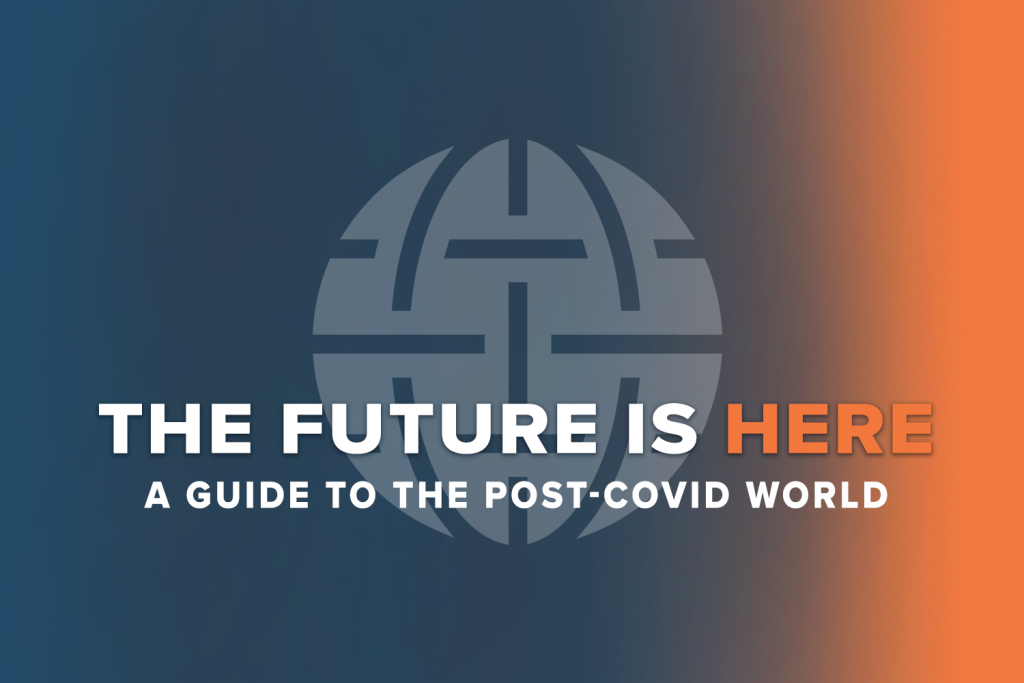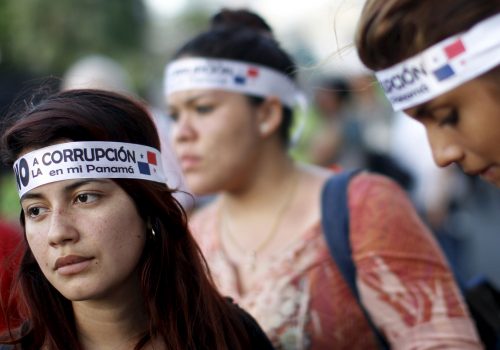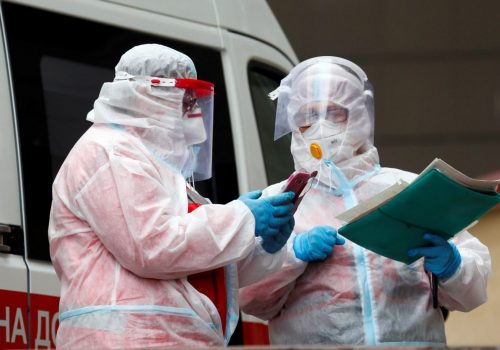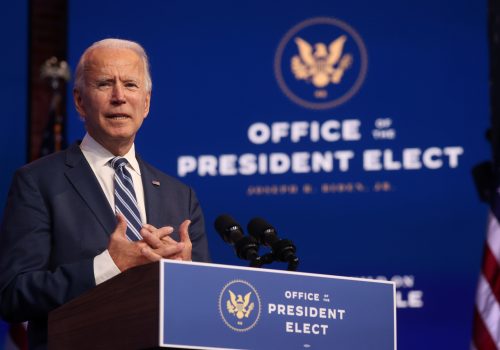The future is here: A guide to the post-COVID world 11/20/2020
Welcome to your guide to where the world is headed during the pandemic era and beyond. Each week, we’ll bring you the latest and most significant expert insights and international news about how coronavirus is reshaping international affairs. To stay updated each week, sign up to the newsletter here.
A quick note: In recognition of the Thanksgiving holiday, we won’t release a new edition of The Future Is Here next week, but we’ll be back in your inbox on December 4.
Let’s take a spin around the globe, in seven minutes or less.
In top stories this week:
- Positive vaccine news keeps coming, but the World Health Organization urged caution as infections keep rising in Europe and the United States.
- Generation COVID is real, and it is growing resentful while bearing the brunt of economic pain.
- “Our couch was our front and patience our weapon”: Germany’s new ad praises couch potatoes amid another wave of the virus.
- But first, we have a special dispatch from Erica Borghard of the New American Engagement Initiative at the Atlantic Council’s Scowcroft Center for Strategy and Security. Here’s her take on this week’s big story.
The big story
This week’s key theme: COVID-19 is compelling the United States to revitalize its role in the world
Two months ahead of assuming office, US President-elect Joe Biden is already standing up a coronavirus task force and devising his plan of attack against the pandemic. The preparations might seem to foreshadow a presidency focused on crises at home, but for Biden’s camp the pandemic has underscored that new forms of American engagement with international partners are essential. Biden has pledged to position the United States at the forefront of seeking global solutions to common challenges—not just to COVID-19, but also to climate change, arms control, and cybersecurity.
But to do so effectively, the president-elect will have to overcome the obstacles to the US playing such a role that have sprung up around the world in recent years.
Subscribe to The future is here: A guide to the post-COVID world
Sign up for a weekly roundup of top expert insights and international news about how coronavirus is reshaping international affairs.

A post-COVID power reshuffle
Biden will assume the presidency as the relative power position of the United States, especially in economic terms, is eroding.
In the diplomatic arena, the Trump administration’s “America First” doctrine has pushed many countries—including traditional allies and partners—to pursue their interests without the United States by their side. Just this weekend, all ten members of the Association of Southeast Asian Nations, along with China, Japan, Australia, and New Zealand, signed the Regional Comprehensive Economic Partnership free-trade agreement. That came after eleven countries signing a revised version of the Trans-Pacific Partnership agreement, which the United States abandoned in 2017.
Rival countries are also crafting their own alternative international organizations, such as the Shanghai Cooperation Organization and the Asian Infrastructure Investment Bank, and creating new tracks inside existing organizations, like Russia’s Open-Ended Working Group on cyber norms within the United Nations Group of Governmental Experts.
The bottom line: To reverse the decline in its global stature, the Biden administration will need to bring fresh thinking to how the United States can reinvent its role in the world through renewed diplomatic and economic engagement with its friends and partners.
The big picture
This week’s key theme, visualized: The pandemic’s lessons on global cooperation
The Biden administration will be coming into office at a time when most Democrats and Independents have concluded that the COVID-19 crisis demands more collaboration with other countries on global challenges. Most Republicans, by contrast, have come away from the crisis believing the US needs to be more self-sufficient. Source: Chicago Council on Global Affairs.
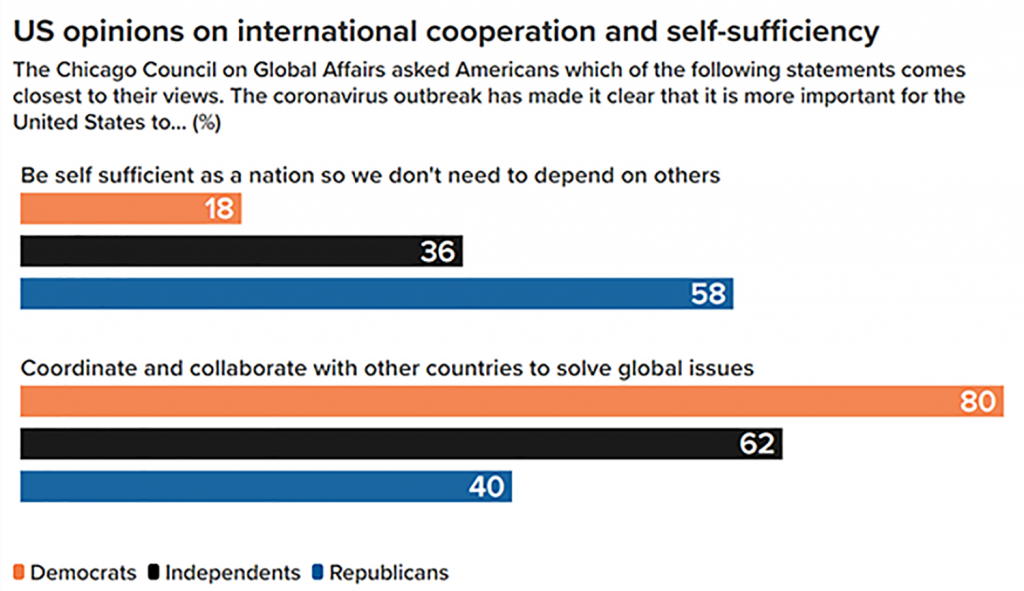
The world in brief
Insights from across the planet, in ten bullets or fewer
- Vaccine makers have more promising news to share. Pfizer plans to file for emergency use of its vaccine in the United States by November 20 after saying data analysis showed the shot to be 95 percent effective, protecting people of all ages and ethnicities, Bloomberg reports. It’s the latest promising vaccine news after Moderna’s shot appeared to be similarly effective. AstraZeneca and the University of Oxford, meanwhile, announced their vaccine produced a strong immune response in elderly people, Reuters reports.
- Be encouraged—but not complacent—about all the vaccine developments, the WHO says. The World Health Organization (WHO) issued the warning after welcoming Moderna’s announcement on the efficacy of its vaccine candidate; but the health body is still concerned about rising cases in Europe and the Americas, Reuters reports. Very limited amounts of any vaccine will be available in the first six months of 2021 for people other than priority health workers, the WHO said.
- As restrictions grind on, nerves are fraying and some are defying lockdowns. Police in Berlin used water cannons and pepper spray to break up protestors, after crowds ignored calls to wear masks and keep distance from each other, The Associated Press reports. Crisis-weary residents in Beirut defied a new lockdown in Lebanon, demonstrators in Greece commemorating a student revolt clashed with police trying to bar public gatherings, and Catholics in the French city of Nantes held an open-air mass to protest pandemic restrictions, Reuters reports.
- Best practices: Finland and Norway controlled COVID-19 without new lockdowns. Tight control of travel and borders as well as political consensus following a short lockdown in March have helped the Nordic nations keep infections under control without strict restrictions, The Wall Street Journal reports. Compulsory testing and quarantine for all travelers also contributed to their success. Working in their favor as well: Social distancing comes naturally to Finns, many of whom like solitude and personal space, according to Reuters.
- A dispute over values could hobble COVID-19 aid in the EU. A veto by Hungary and Poland threatens to hold up the distribution of funds to alleviate the pandemic’s economic impact, after the disbursement became conditional on countries’ commitment to the bloc’s core values, CNBC reports. Hungary and Poland oppose the measure, possibly derailing the historic agreement, reached in July, to borrow funds jointly.
- Generation COVID is the hardest hit by job losses and pandemic curbs. People under thirty are growing resentful over the unequal economic effects of the pandemic, the Financial Times says, citing a global survey of more than eight hundred respondents aged sixteen to thirty. While older generations may be more at risk for serious illness, they are financially more secure and continue to hold disproportionate political sway, leaving students and younger workers to suffer more from the pandemic’s economic damage.
- QUOTE: “We are not in this together, millennials have to take the brunt of the sacrifice,” the Financial Times cites Polina R., a thirty-year-old from Montreal, Canada, as saying. “If you don’t watch out that we don’t end up jobless and poorer, why should we protect you?”
- Airlines are still waiting for lift off as EU governments disagree on common rules for rapid COVID-19 tests. Betting on speedy testing to help revive the global travel industry, airlines have suffered a fresh blow as many European Union countries oppose common rules on the tests, Reuters says, citing a document prepared by the German government, the current holder of the bloc’s rotating presidency.
- Don’t count on a rebound yet: A bellwether for global trade predicts continuing impact on supply chains. Maersk, the world’s largest container shipping firm, reported a faster-than-expected rebound in its third-quarter profit as eased pandemic restrictions helped lift demand, CNBC reports. But the Danish firm’s CEO, Soren Skou, says the pandemic is still affecting global supply chains, and he predicts a high degree of uncertainty extending into coming quarters as fresh restrictions are imposed worldwide.
- QUOTE: “There is a real risk that the confluence of revolutionary shifts in technology, the pressures of climate change, and the devastation unleashed by the coronavirus pandemic on the global economy will accelerate the decline in competitiveness” of European industry, Peggy Hollinger writes in the Financial Times.
- The pandemic is shaking up global city rankings. An exodus of foreign workers pushed down prices in Singapore, while US-China tensions made most Chinese cities more expensive, the BBC reports, citing the Economist Intelligence Unit’s annual ranking of the world’s most expensive cities. Hong Kong, Zurich, and Paris are now the top three most expensive cities. Singapore and Osaka, which tied Hong Kong for first place last year, have slipped down the rankings. Meanwhile, Bangkok fell twenty places to rank in forty-sixth place.
- Campaign for couch potatoes: Germany’s “be lazy, save lives” video is an online hit. The tongue-in-cheek video released by Chancellor Angela Merkel’s spokesman contrasts COVID-19 obligations to stay at home with the sacrifices of older Germans who endured war and real hardships. And it’s going viral, getting more than one million hits, Reuters reports.
The inside scoop
Insights from the Atlantic Council
